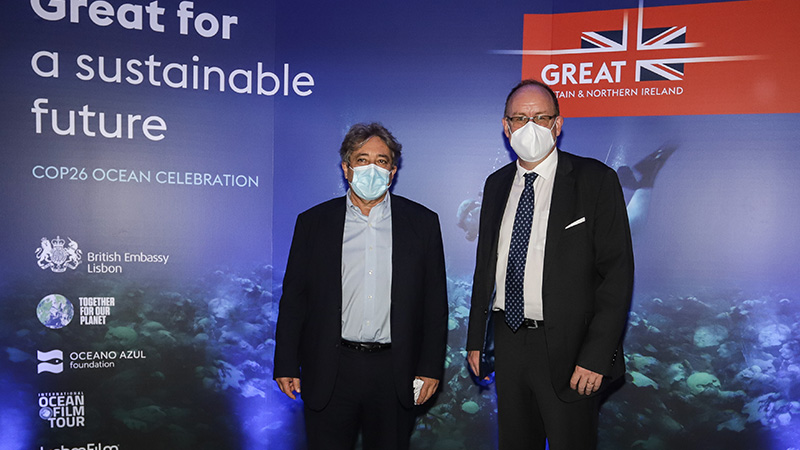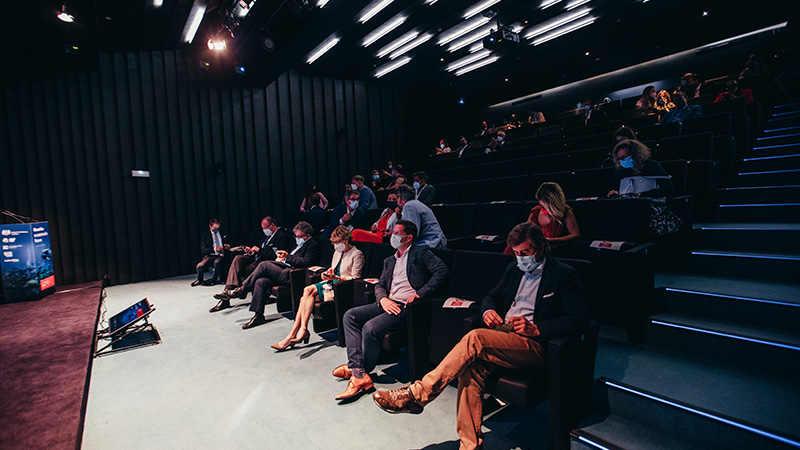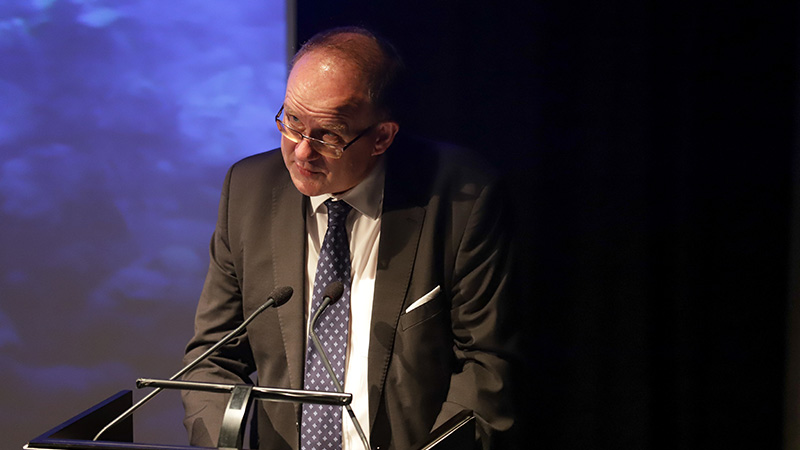Sophie Sadler interviewed British Ambassador Chris Sainty to explain more about COP26 and how it is relevant to the ex-pat community.
In your last interview with me, you stated that COP26 was one of the most important events to have happened in your career. Can you explain why?
I certainly still believe that COP26 is one of the most important events to happen in my career. It’s difficult to overemphasise just how crucial the summit is for the future of our planet. COP26 is seen by many as the world’s last chance to come together and get runaway climate change under control.
At COP21, in Paris in 2015, every country agreed to work together to limit global warming to well below two degrees and aim for 1.5 degrees, and to bring forward plans – known as Nationally Determined Contributions, or ‘NDCs’ – setting out how much we would reduce our respective countries’ emissions.
The UK’s presidency for COP26 – in partnership with Italy – coincides with the first significant test of the Paris Agreement, as it is the first point that countries are expected to reassess their NDCs as part of the five-yearly ambition cycle established by the Agreement. As part of this reassessment, we want to see a strong push for further ambition. The commitments laid out in Paris did not come close to limiting global warming to 1.5 degrees, and the window for achieving this is closing. The rest of this decade up to 2030 will be crucial. So, as momentous as Paris was, countries must go much further at COP26 to keep the hope of limiting temperature rises to 1.5 degrees alive.
Do you know which figures from the Portuguese government will be attending and how closely you will be working with them?
Countries are still finalising their delegations but I know that the Portuguese Prime Minister, António Costa, intends to attend COP 26. It is vitally important that world leaders can meet in person in Glasgow to agree on urgent action to tackle climate change and demonstrate collective global leadership.
What preparation have you done for the event?
The UK, alongside our partner Italy, has been working for some time to lay the groundwork for a successful COP26 that delivers the urgent global action needed. As hosts, we want to lead by example. We have boosted our own ambitions, including on energy transition, achieving net zero and delivering a green recovery from the pandemic. And we are continually talking to other countries – including through the G7, G20, and at the UN General Assembly – to encourage them to do the same.
Here in Portugal, the British Embassy has brought political leaders, businesses and civil society together on a range of issues linked to the key COP26 goals, such as protecting our oceans, establishing closer links and collaboration on green finance, and developing sustainable, ‘smart’ cities. This work will continue beyond COP26, especially as we look towards the UN Oceans Conference in Lisbon next year.
You mentioned to me before that the UK and Portugal work closely on environmental issues. Can you explain what joint initiatives you have and why these might help the ‘race to zero’.
There has been a greater focus in recent years on the environment and sustainability, such as protecting wildlife and natural habitats, and reducing harmful plastic waste. But restoring, protecting and enhancing our natural environment is also vital to meeting the temperature goals of the Paris Agreement and adapting to the effects of climate change. It is estimated that nature-based solutions could provide around one third of the cost-effective mitigation needed by 2030 to stabilise temperatures.
One area where the UK and Portugal are working closely together is on championing marine ecosystems and protecting the world’s oceans. We are both members of the Global Ocean Alliance’s “30 by 30” initiative. Launched by the UK in 2019, this is an international commitment to protect at least 30% of the global ocean in Marine Protected Areas by 2030. Portugal is also co-host, with Kenya, of next year’s UN Ocean Conference, where I hope we will see the world come together to save our ocean and protect our future.

Maritime Minister Ricardo Serrão Santos and British Ambassador Chris Sainty
How motivated do you think Portugal are to achieve the targets being set?
I believe that Portugal is setting an excellent example internationally. It set ambitious targets in its National Plan for reducing emissions and transitioning its energy sources. It showed leadership under its EU Presidency earlier in the year to secure the EU’s first Climate Law. But to meet the Paris Agreement goals we must all work faster to decarbonise the global economy over the next decade, requiring stronger national action and international collaboration. I am looking forward to continuing to work with Portugal – a like-minded partner – on these efforts in the years ahead.
Is there any way that Portugal and the UK can work together to offset carbon emissions from the large number of flights between the two countries?
Emissions from international flights are handled outside the Paris Agreement, and are instead managed by ICAO, the International Civil Aviation Organisation, which is the UN’s dedicated agency for regulating international aviation. I am proud to say that the UK plays a key leadership role in the ICAO, and in 2016 was instrumental in securing agreement on the first ever global market-based measure to tackle carbon emissions in a single sector, called CORSIA – the Carbon Offsetting and Reduction Scheme for International Aviation. Both Portugal – as an EU member state – and the UK are participating in the initial voluntary phase of this scheme, which began this year.
A large part of the ambassadorial role is to stimulate trade between the two countries. Can more be done to ensure these businesses are carbon neutral?
The UK and Portugal have an extensive and long-standing trading relationship. Businesses and industry have a key role to play in the Race to Zero, alongside national governments, cities and regions, investors and civil society – we really do need to see a collaborative effort. But it is not a choice between cleaning up our environment and growing our economies. The clean growth and climate adaptation agenda offers a wealth of opportunities for our businesses, arguably the most significant economic growth opportunity of the 21st century. Global trade in low-carbon goods and services is expected to grow from £150bn in 2015 to a staggering £2.8 – £5.1tn in 2050. Prime Minister Boris Johnson has set out a Ten Point Plan for the UK’s transition to a net zero economy, to ensure we make the most of these new growth and employment opportunities across the UK.
The UK is leading the way to create renewable energy with off-shore windfarms. Portugal is a small GHG contributor only 1% of EU total yet leads the way in greening energy generation. Is there more to be done to share this technology with slower countries?
Offshore wind is a critical source of renewable energy. The UK is already leading the way as the country generating the most electricity from offshore wind. We plan to quadruple our capacity by 2030, alongside developments in a diverse range of other low carbon energy sources such as hydrogen. Like the UK, Portugal has a strategic focus on renewables and is ahead of the game on energy transition, with over 30% of its energy matrix already coming from renewable sources.
At COP26’s Energy Day we want to take the developed world, developing countries and businesses with us in accelerating the global transition away from coal power towards renewable energy. We are putting huge effort into broadening and deepening the Powering Past Coal Alliance, a coalition of countries, cities, banks and utilities committed to phasing out unabated coal power, and also supporting coal-dependent countries to make an equitable and just transition away from coal.

In the Algarve we are seeing an increasing number of forest fires – do you think these are a result of climate change?
We know the very real dangers that forest fires pose to lives and livelihoods, including for our British communities here in Portugal. It is an important issue for the Embassy and I am thankful for the significant progress made in forest management and response in recent years by the civil protection authorities, which helps mitigate the risks.
It is widely recognised that Portugal is one of the European countries likely to be most acutely affected by the higher temperatures brought about by climate change, not least the increased risk of forest fires. We all need to play our part to boost global ambition to limit temperature rises and adapt to the impact of climate change.
How can we help the developing world to become engaged with achieving net zero?
The impacts of climate change are already being felt across the world, especially in the most vulnerable communities. Even if we stopped emissions rising today, the world would still need to deal with significant climate disruption, like extreme weather and climate-related shocks. So it is vital that we work with developing countries not only on mitigation – supporting them to move away from coal power and play their part in delivering Net Zero – but also on adaptation measures to increase resilience to climate change.
A major part of this is finance. The developed world must make good on its promise to mobilise at least $100bn in international climate finance each year – a key goal of COP26. The UK has already committed to doubling its contribution to £11.6bn over the next five years – other countries have recently announced increases of their own, but there is much more to do. The UK’s financial contribution to date has already reduced global greenhouse gas emissions by 21 million tonnes (the equivalent of taking three million cars off the road for a year), provided 33 million people with improved access to clean energy, and helped 66 million people to cope with the effects of climate change, from supporting poor farmers to grow climate resilient crops, to preserving water in areas facing an increased drought risk.
What do you do personally to try to be more environmentally conscious and what do you think we can all do to help Portugal achieve climate change goals?
It is of course very difficult to achieve net zero in our personal lives but I believe that we should all think hard about this, make the best contribution we can and try to set an example to others. I regularly cycle to work: in fact I am rather proud of the fact that I have cycled over 20,000km in the last five years. . We have stopped serving and consuming red meat at our residence. We have a vegetable garden and regularly serve home-grown produce to our guests. We’ve also made a big effort at home and across the embassy to reduce the amount of plastic we consume and to recycle the plastic we still use – in fact we have banned single use plastics from our office and our official functions. My official Embassy car is 100% electric.
But as a team we also have a strong sense of environmental responsibility at the British Embassy and I am very proud of the commitment that many of my colleagues show in this area. We have a Green Team at post, which in 2020 managed to eliminate single use plastic from our events and daily routines at my Residence, The Embassy and our Vice-consulate in Portimão. This was achieved through (replacing plastic cutlery, plates and cups) , workshops to create awareness and by providing staff with sustainable glass bottles and food boxes. We have since then been working with different stakeholders, charities and partners, like Maria Granel, Sea Sheppard and Hortas Lx to encourage reusing, reducing and recycling, both at work and at home. This year we aim to concentrate further on eliminating food waste, textile sustainability and protecting our oceans. We (aim to work with) artists like Artur Bordalo who use plastic collected at beach cleans to create artistic sculptures. Together we are working to develop a credible Net Zero plan of our own – this will be a big corporate goal for us in the coming months.













